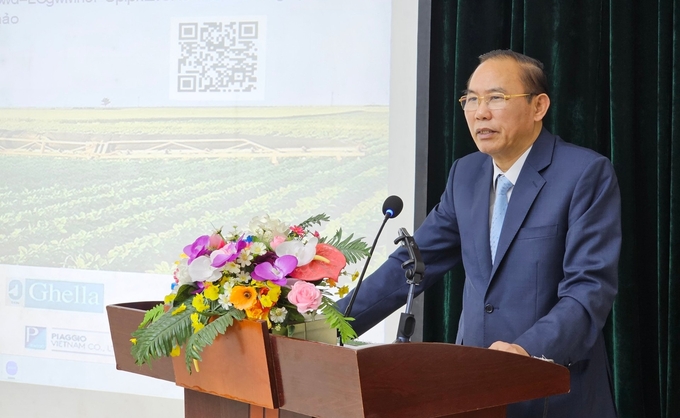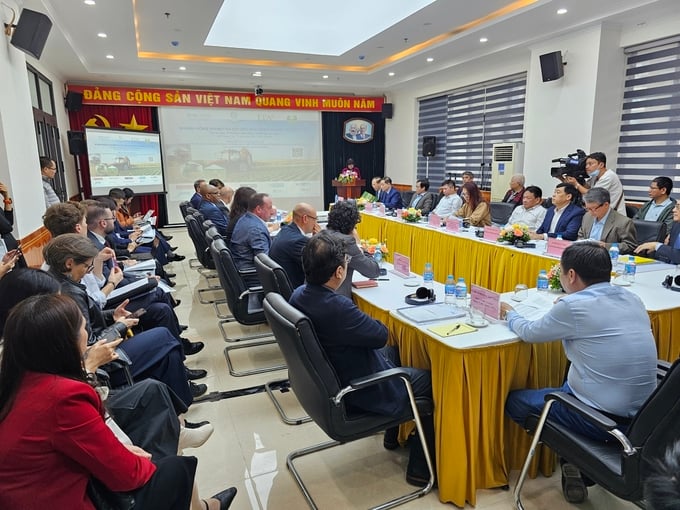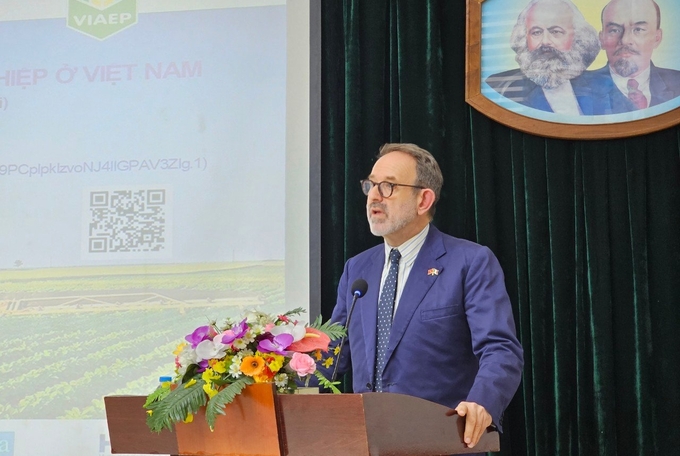June 19, 2025 | 04:20 GMT +7
June 19, 2025 | 04:20 GMT +7
Hotline: 0913.378.918
June 19, 2025 | 04:20 GMT +7
Hotline: 0913.378.918

Deputy Minister Phung Duc Tien speaking at the workshop. Photo: Bao Thang.
Deputy Minister of MARD Phung Duc Tien, speaking at the Workshop on Agriculture and Agricultural Mechanization in Vietnam, recalled some notable achievements of the agriculture sector in 2023, including an agricultural trade surplus of more than 12 billion USD and recent record-high GDP growth of 3.83%.
However, the Deputy Minister highlighted current constraints, such as the preponderance of small-scale manufacturing, low worker productivity, and insufficient automation in numerous areas. He remarked that the industry's competition has yet to gain substantial traction, offering obstacles to enhancing quality and value while also developing a respected international brand.
Another problem is the industry's slow increase in processing and deep-processing rates during the past few years. The export amount of agro-forestry-fishery goods has steadily increased, although mostly raw exports.
The causes are low scientific and technological competency, limited ability to apply science and technology, and adherence to national and international quality standards.

Overview of the workshop at the Institute of Electromechanics and Technology after the harvest on the afternoon of January 15. Photo: Bao Thang.
According to studies, some phases of agriculture in particular sectors are relatively mechanized, with cultivation reaching 70–100% (soil preparation, irrigation, plant protection) and livestock farming ranging from 55–90% (feeding, water delivery). However, there are still hurdles to attaining extensive mechanization in agricultural production, such as producing machinery and equipment that does not satisfy the variety and quantity requirements.
The Deputy Minister expressed his hope that relevant parties, particularly Italian organizations and equipment enterprises, would show interest and perform extensive research and investment in agricultural machinery fit for the Vietnamese market.
"Vietnam wishes and sets the objective of producing high-quality agricultural goods with higher added value, enabling participation in global value chains, and developing a national agricultural brand. At the same time, we want to mobilize social resources to invest in agricultural infrastructure, rural regions, and agricultural support services," the Deputy Minister stated.
Marco Della Seta, the Italian Ambassador to Vietnam, praised Vietnam's growth potential with a population of 100 people in terms of chances for businesses seeking to export or build a presence in agriculture.
According to Mr. Marco, thanks to the growing number of young and active labor force and middle class, which is expected to reach 50% by 2035, Vietnam has a promising potential for domestic consumption, particularly for high-quality products such as food, which is expected to grow significantly in the coming years.
Fabio De Cillis, Director of the Italian Trade Agency in Vietnam, expounded on the matter. He mentioned that agriculture still accounts for a large share of Vietnam's GDP. The Vietnamese government has targeted this sector, adopting a variety of programs and incentives to help farmers and agricultural enterprises. These efforts seek to increase production, simplify regulations, and encourage sustainable farming practices.
Rice is the leading agricultural crop in Vietnam, followed by sugarcane, cassava, rubber, pepper, cashew, and fruit trees. Improved agricultural technology has helped enhance yields despite a reduction in cultivated acreage, opening up the potential for farm automation and modernization, he said.

Italian Ambassador to Vietnam, Marco Della Seta, highly appreciates the potential of the Vietnamese economy. Photo: Bao Thang.
Speaking at the session, representatives from various Italian firms revealed that Italy, a country steeped in agriculture, has enterprises such as the legendary Lamborghini that sprang from a tractor manufacturing facility. Leveraging this foundation, Italy has many parallels and provides reasonably decent assistance for Vietnam's agricultural machinery business, a country with enormous potential but equipment that typically lags below regional and global standards.
Foreign businesses, particularly those from China, South Korea, and Japan, now dominate the Vietnamese agricultural machinery sector. Italian firms indicated that this is due to the Vietnamese perception that European items are pricey.
After years of study and market penetration efforts, Italian distributors have opted to increase their investment in developing an agent and distributor network to enter the Vietnamese market. These intermediaries play an important role in promoting the spread and accessibility of agricultural machinery.

The mechanization capability of Vietnamese agriculture is still limited. Photo: TL.
In terms of worldwide commerce, Italy is consistently ranked among the top 20 suppliers to Vietnam, as well as among the top three main European suppliers.
Ambassador Marco of Italy expressed optimism that both sides would soon build tight collaboration links, spanning from distributors and agents to local producers. "Let's collaborate with reliable partners who have extensive knowledge of the Vietnamese market to significantly enhance the chances of success for European businesses," he stressed.
Translated by Linh Linh

(VAN) To address plastic pollution, closing the plastic recycling cycle will bring significant economic and environmental benefits.

(VAN) According to the Binh Thuan Department of Industry and Trade, in the first five months of 2025, Binh Thuan's dragon fruit export turnover increased by 20.65% compared to the same period last year.

(VAN) EU countries on Thursday gave final approval to new tariffs on fertilizer imports from Russia, a move aimed at cutting off revenue that could support Moscow’s war in Ukraine, despite concerns from European farmers.

(VAN) The working delegation from the Ministry of Agriculture and Environment conducted an important trip to the Netherlands to strengthen strategic partnerships and sustainable development in the agricultural sector.

(VAN) The letter ‘A Plea from the Ocean’ not only evokes emotion but also awakens the human conscience to the responsibility of protecting life on Earth.

(VAN) The Department of Agriculture in South Africa has announced the country’s first mass vaccination of poultry to prevent local birds from contracting avian influenza.

(VAN) Establishment of the Mekong Delta Regional Agricultural Linkage Center, aiming for a closed value chain, deep processing, trading platforms, and international market connectivity.